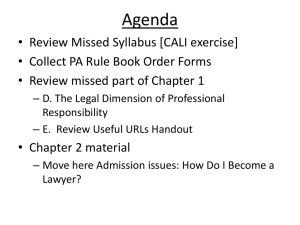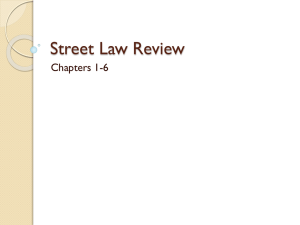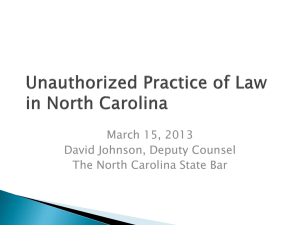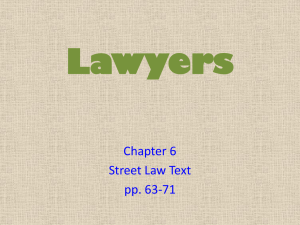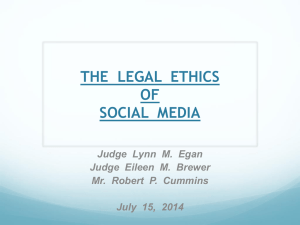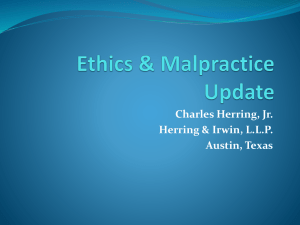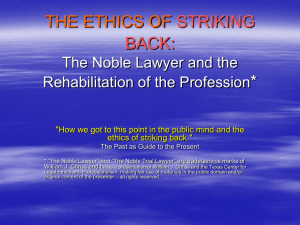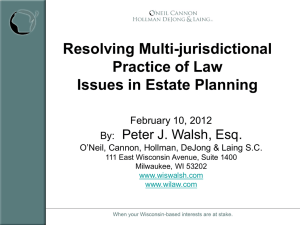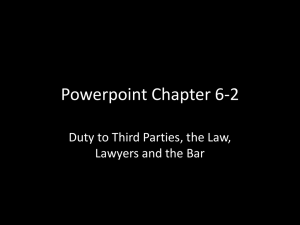III. CREATING THE LAWYER-CLIENT
advertisement
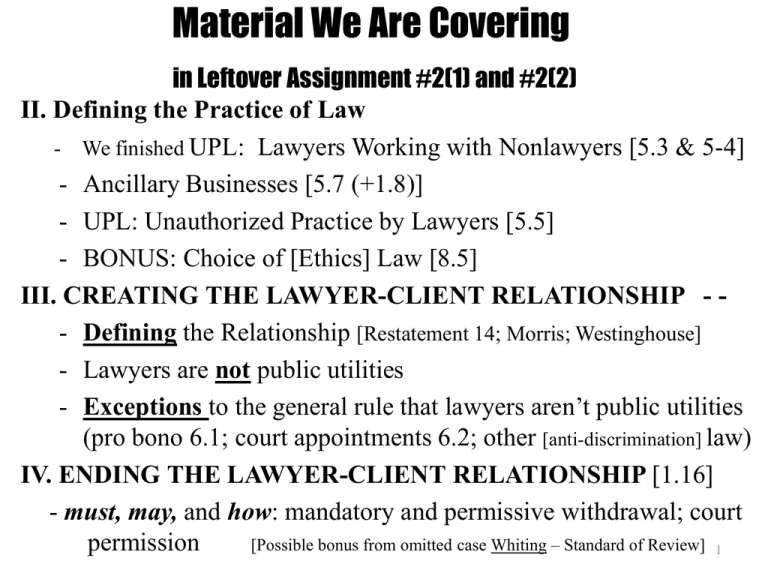
Material We Are Covering in Leftover Assignment #2(1) and #2(2) II. Defining the Practice of Law - We finished UPL: Lawyers Working with Nonlawyers [5.3 & 5-4] - Ancillary Businesses [5.7 (+1.8)] - UPL: Unauthorized Practice by Lawyers [5.5] - BONUS: Choice of [Ethics] Law [8.5] III. CREATING THE LAWYER-CLIENT RELATIONSHIP - - Defining the Relationship [Restatement 14; Morris; Westinghouse] - Lawyers are not public utilities - Exceptions to the general rule that lawyers aren’t public utilities (pro bono 6.1; court appointments 6.2; other [anti-discrimination] law) IV. ENDING THE LAWYER-CLIENT RELATIONSHIP [1.16] - must, may, and how: mandatory and permissive withdrawal; court permission [Possible bonus from omitted case Whiting – Standard of Review] 1 2-7 (p. 45). Joan Lawyer has a leading real estate practice in Small County. She is also part owner of Small County Title. She suggests to her clients who purchase real estate that they consider purchasing their title insurance from Small County Title. Joan discloses in writing that she owns the company and recommends that her clients consider the rates and policies of competing title insurance companies. She explains that the services provided by Small County Title are not legal services and that the legal ethics rules do not apply to the purchase of title insurance. Joan suggests that clients feel free to consult another lawyer as to whether they should purchase title insurance from a company their real estate lawyer owns. The rates and policies that Small County Title offers are comparable to those of its competitors. Under what circumstances, if any, would this be ok? 2 Question 2-7 Choices 1. Joan is not subject to discipline if the clients give informed consent in writing. 2. Joan is not subject to discipline because she informs clients of the opportunity to consult independent counsel. 3. Joan is not subject to discipline because the rates and policies of Small County Title are comparable to those of its competitors. 4. Joan is subject to discipline unless she complies with all three requirements listed above. 3 Unauthorized Practice by Lawyers 4 2-8 (p. 47). Giant Manufacturer wants to buy widgets from Small Producer. Both Giant and Small are headquartered in California. Small's outside counsel, John Lawyer, admitted to practice in New York, travels to California from his New York office to negotiate the deal on Small's behalf. After extensive negotiations, Giant agrees to pay Small $10 million for the widgets. John bills Small for $500,0000] thousand for legal fees. Small believes the fee is far too high and refuses to pay. It retains a California lawyer and decides to argue that it does not have to pay anything to John Lawyer because he was engaged in unauthorized practice of law. Will Small’s argument succeed? 5 • 2-9 (p. 56). Joan Jones is an associate at Franklin & Ignatius. She is admitted to the New York Bar. The firm sends her to the State of Sirius to appear in court in a case where the firm has been admitted pro hac vice. Has she committed UPL? 6 2-10 (p. 57). Did Joan Jones violate UPL when she entered Fordham to investigate and prepare the case before the firm and its lawyers were admitted pro hac vice? 2-11 (p. 57). Would she have violated UPL if the firm had brought an arbitration on behalf of its client and not a court case? 2-12 (p. 58) . Does Joan violate UPL if she transfers full-time to F&I's Sirius office and works under the supervision of a Sirius admitted attorney? 2-13 (p. 58) . Does Joan commit UPL if she leaves F&I to become in-house counsel at Monolith, Inc., located in Sirius? 7 2-14 (p. 59). Joan rejoins F&I as a partner in its New York office. As a corporate partner, she is in charge of representing ABC, Inc., based in New Jersey, in its takeover of DEF, Inc., based in New York. Her team includes Jim, a NY lawyer coordinating the NJ litigation, and Jane, a corporate associate admitted in NY and NJ. They discover ABC has made a fraudulent statement relevant to the litigation. NJ requires disclosure. NY does not. The F&I lawyers do not disclose. Which of the following is true? 1. If the predominant effect is in NJ, all face discipline absent contrary reasonable belief. 2. Only Jane faces discipline because she is a NJ lawyer. 3. Only Jim faces discipline because he is litigating the matter in NJ. 4. None face discipline because NY does not require disclosure. 8 Creating the Lawyer-Client Relationship (p.61) [Morris 64; Westinghouse 67; Nathanson 77] Restatement (RS) §14, 1.13(a) & (f-g); 6.2 Problems 2-15 to 2-20 9 Casebook p. 61: Another building block of law practice is the lawyer-client relationship. In the United States, the general rule is that a lawyer has full discretion to decide whether to accept a client or not, subject to very limited exceptions. These exceptions include the lawyer’s obligation to accept a court appointment and to comply with anti-discrimination laws. Determining whether a lawyer-client relationship exists is critically important because many of the rules and principles you will study only apply if there is a lawyerclient relationship. Nonetheless, as this Part demonstrates, the task of determining whether a lawyer has entered a lawyer-client relationship, or has obligations similar to those found in a lawyer-client relationship, can be quite complex. Restatement 14 (p. 62) is really really IMPORTANT. 10 2-16 (p. 62). An attorney closed her law practice when she became a state senator. A bank, one of the senator's former private clients, asked her as its senator to try to persuade a state agency to grant the bank a license to open a new branch bank. While the bank's request was pending before the agency, the senator wrote a letter on her legislative letterhead to the agency's chair, asserting that the branch would satisfy a local business need and urging that the bank's application be granted. The senator neither sought nor received any compensation from the bank for her efforts. Eventually the agency granted the bank's application, in part because of the senator's efforts. Is the senator subject to discipline? 11 2-17 (p. 63).. Lincoln & Fordham has represented Center Manufacturing in its transactional work. The SEC begins an investigation of Center Manufacturing. Lincoln & Fordham explains to Center that it cannot represent it in the SEC investigation. Center obtains other counsel. Nonetheless, from time to time, Center asks Lincoln & Fordham about issues that arise in the SEC matter and Lincoln & Fordham provides answers. Does Center have a lawyer-client relationship with Center for purposes of the SEC investigation? 12 2-18 (p. 66). The firm of Lincoln & Fordham represents the Computer & Software Association, an organization of businesses who manufacture computers or create software, in challenging proposed regulations regarding data privacy. Lincoln & Fordham has collected information on business practices from each of the businesses in the Association. Lincoln & Fordham agrees to represent one of those businesses, GoFind, in an antitrust suit against another, MacroTough. Was MacroTough a client of Lincoln & Fordham by virtue of its representation of the Computer & Software Business Association? 13 Exceptions to the general rule that lawyers aren’t public utilities (pro bono 6.1; court appointments 6.2; other [anti-discrimination] law) 14 2-19 (p. 74). The court appoints a lawyer who believes that abortion is murder to represent a teenage girl Seeking court permission to obtain an abortion without the consent of her parents. The lawyer explains that he believes that abortion is murder and asks the court to withdraw the appointment. The court refuses. Under the Rules, which of the following is true? 1. The lawyer should not have sought to avoid the appointment. 2. The lawyer was ethically permitted to seek to avoid the appointment and can refuse the representation. 3. The lawyer was ethically permitted to seek to avoid the appointment but must continue the representation. 4. The lawyer must represent the client, but does not have to follow the client's instructions. 15 2-20 (p. 76). Joan Lawyer practices matrimonial law. She only represents women because she Seeks to "redress the social and legal wrongs done to women." John Client asks her to represent him. She refuses on the ground that he is a man. John Client sues her for unlawful discrimination. Under Nathanson v. MCAD, what is the result? 16 Ending the Lawyer-Client Relationship (p.82) [Whiting] Rule 1.16 Problems 2-21 to 2-25 Figure out Must, May, and How 17 2-22 (p. 83). Attorney is employed in the legal department of Electco, a public utility company, and represents that company in litigation. Electco has been sued by a consumer group that alleges Electco is guilty of various acts in violation of its charter. Through its general counsel, Electco has instructed Attorney not to negotiate a settlement but to go to trial under any circumstances since a precedent needs to be established. Attorney believes the case should be settled if possible. Must Attorney withdraw as counsel in the case? 18 2-23 (p. 85). An attorney represents a client in commercial litigation that is scheduled to go to trial in two months. Over the past several weeks, the client has disagreed with almost every tactical decision that the attorney has made. Frustrated, the attorney finally said to the client that is she didn't like the way he was handling the lawsuit, perhaps she should get another lawyer. The client was upset at the suggestion and accused the attorney of trying to get out of the case. Reasonably believing that he could no longer work effectively with the client, the attorney sought the client's permission to withdraw from the representation, and the client reluctantly agreed. After giving the client sufficient notice to obtain replacement counsel, the attorney requested the court's permission to withdraw from the litigation, but the court denied the request. May the attorney withdraw from the representation? 19 2-21(p. 82). Attorney Alpha, a sole practitioner, recently suffered a heart attack and was advised that she could not return to work for six months. Alpha delivered all of her clients' files to Attorney Beta, who is also a sole practitioner. Beta agreed to review each client's file promptly, take any action necessary to protect each client's interests, and treat the information in the files as confidential. Alpha then wrote her clients, advising each client that the client's file had been delivered to Beta for review and for any action necessary to protect the client's interest, and that the client was free to select another lawyer. Alpha knows that Beta is a competent attorney. Beta did not accept the file of any person whose interests were, or could be, adverse to the interests of any of Beta's own clients. Was it proper for Alpha to deliver the files to Beta for review? (i.e. How should you end things?) 20 Do you know about the “Standard of Review?” • The omitted case – Whiting v. Lacara p. 86 – stated that the trial court’s ruling on a motion to withdraw would be reviewed for “abuse of discretion.” • What other kinds of “standards of review” exist? • Do courts care about “standard of review”? • Why should you care about “standard of review”? • How can you learn the appropriate standard of review for a given appeal? 21 Not assigned 22 2-24 (p. 90). Attorney experience several instances when clients failed to pay their fees in a timely manner, but it was too late in the representation to withdraw without prejudicing the clients. To avoid a recurrence of this situation, Attorney had drafted a stipulation of consent to withdraw if fees are not paid according to the fee agreement. She proposes to have all clients sign the stipulation at the outset of the representation. Is it proper for Attorney to use the stipulation to withdraw from representation whenever a client fails to pay fees? 23 2-25 (p. 91). Rule 1.16 implements the dominant conception that the lawyer should serve as a "neutral partisan" for her client. Yes or No 24
